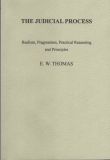用户登陆搜 索 |
查看图书
图书目录:Introduction
Practical skills and legal theory Judges make law - endlessly And judges also make policy- regularly The interpretative approach is wanting Judges and legal theory Theorists and legal practice Bridging the divide Conclusion 2 Muddling along Practical muddling along The declaratory theory of law Positivism Die Meistersinger yon Nurnberg Positivism and its stubborn survival Aspirational positivism Romantic positivism Natural law Superstition and/or speculation Natural law and human rights jurisprudence Natural law and parliamentary supremacy Conclusion 3 The 'curse' of formalism Timur, the barbarian The lingering legacy of formalism Formalism will not stay dead The formalism of 'presumptive positivism' A short portrait of the formalist judge A case study: Sevcon Ltd v Lucas CAB Ltd Conclusion 4 Legal fundamentalism Legal fundamentalism The democratic legitimacy of the judiciary, Judicial independence and impartiality The will of the people The judge's values! Other considerations 'Judicial activism' The parable of the activist judge An ersatz concept And Lord Denning? Conservative activism A 'political' process! Conclusion 5 The idolatry of certainty A conversation in chambers An uncertain world The law is inherently uncertain Acknowledged causes of uncertainty The uncertainty of the facts The uncertainty in defining the legal dispute The uncertainty of the ratio The uncertainty of exceptions The uncertainty as to what other jurisdictions are up to The uncertainty arising from an abundance of riches Some underlying causes of uncertainty The imprecision of language The need for finality in judicial adjudication The 'status' of justice Two critical consequences Certainty and precedent Certainty as a relevant consideration Conclusion 6. The piety of precedent A foolish consistency ... The doctrine of precedent The perceived value of precedent unmasked Stability Reliance Legitimacy ludicial craftsmanship and so on Efficiency 'Non-binding' precedents? Persuasive precedents 'Famous dicta' Relevance and justice The 'attitude of mind' Conclusion 7. The foibles of precedent - a case study Lewis v Attorney-General of Jamaica An assessment, a rebuke and a note of optimism Postscript; don't speak too soon! 8. There is no impersonal law A shout from the rooftops An internal logic and coherence? The doyen - Ronald Dworkin Dworkin's implausible distinction betweenprinciples and rules Dworkin's implausible distinction between principles and policy Dworkin's implausible rejection of judicial discretion Dworkin's implausible justification for precedent TrigweU's case: Hercules J confronts Athena j Conclusion 9 So. what is the law? 'The law' is essentially a process Is 'the law' what the courts ultimately decide? A more fluid concept The 'as is' and 'ought to be' distinction dissimulated The rule of law in the scheme of things Rechtsstaat or justizstaat? The judicial oath Conclusion 10 The constraints on the judiciary The significance of judicial constraints The external constraints Internalised constraints Some structural cunstraints A legitimate role for certainty A iustifiable role for precedent 'Leave it to Parliament' Minimalism Vanquishing general discretions Conclusion 11 Towards a new judicial methodology A methodology for the twenty-first century Justice and relevance The reality of justice But is justice 'knowable'? The imperative to be relevant A case study: Fletcher Challenge Energy v ECNZ Ltd Conclusion 12 Of realism and pragmatism Hard realism A new realism Realism in practice Determined pragmatism Legal pragmatism Fragmatism in practice Conclusion 13 Of ... practical reasoning and principles Practical reasoning The theory of practical reasoning Practical, practical reasoning The all-important facts The legal issue The initial premise A community of considerations Community values Principles to the forefront Common sense A summary Principles Principles and reason Legal principles Conclusion 14 Taking law seriously So, will there be a difference? Making overt that which is covert The flow of the river. The main differences Taking law seriously 15 A theory of ameliorative justice Our Lady of Justice ... why the sword? The precept of non-exploitation The ground is cleared - a reconciliation The ground is further cleared - justice? Liberal individualism Equity The common law Contract Tort Public and administrative law ... of Marxism and Critical Legal Studies Justice and fairness Conclusion subject index Authors index |

